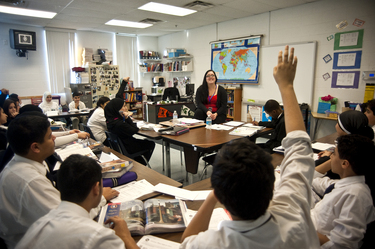Michigan charter school students are out-learning their traditional district peers on an annual basis by two to three months, according to a Stanford University study released Thursday.

High school substitute teacher Andrea Merry teachers social studies at Central Academy in Ann Arbor Wednesday, Jan. 9, 2013. Central Academy recently was recognized for exceeding student test-score expectations by Bridge Magazine. A new Stanford study released Thursday also reflects well on Michigan charter schools.
Joseph Tobianski | AnnArbor.com file photo
But when compared with the state’s traditional districts, the charter schools fare better.
According to the new CREDO study, 35 percent of the state’s charter schools have more positive learning gains than their school district counterparts in reading, while 2 percent of charter schools have lower learning gains.
In math, 42 percent of Michigan charters perform better than their traditional districts and 6 percent perform worse.
CREDO says it is an independent research organization that’s mission is to improve the body of empirical evidence being used to inform and drive education decision-making, according to its website. CREDO has analyzed the effectiveness of charter schools in Indiana and New Jersey as well.
This study comes on the heels of a Bridge Magazine analysis that shows high-poverty school districts and charter academies are exceeding test-score expectations, questioning whether the best teaching in the state is in fact taking place at Michigan’s poorest schools.
The Bridge report looked at schools’ test scores, while accounting for the socioeconomic status of children who walk through the doors.
The CREDO study shows 70 percent of students enrolled in the state’s charter schools are low-income, compared to 43 percent at traditional public schools and 55 percent at feeder school districts. Feeders are those traditional districts that have charter schools located within their attendance boundaries, according to the study’s parameters.
Michigan’s charter schools also have a greater percentage of black and Hispanic students than their feeders and other traditional districts, the CREDO study says.
Fifty-seven percent of students enrolled in the state’s charter schools are black, compared to 17 percent at traditional districts and 25 percent at feeder school districts. The difference in Hispanic student populations is minimal: 6 percent compared to 5 percent at traditional districts.
Nearly half (49 percent) of Michigan’s charter school students are located in the greater-Detroit region. Washtenaw County is included in this region.
The CREDO report found the typical student at a Michigan charter school gains more learning in a year than his or her traditional school district peer, amounting to about an additional two months of growth in reading and math.
The results for the typical student in a Detroit charter school (27 percent of the state’s charter students) were even more pronounced. Students gained on average nearly three months of achievement for each year they attended a Detroit charter school, according to Thursday’s media release.
“These findings show that Michigan has set policies and practices for charter schools and their authorizers to produce consistent high quality across the state. The findings are especially welcome for students in communities that face significant education challenges,” CREDO director Margaret Raymond said in a statement.
- Download the complete Center for Research on Education Outcomes charter school study here.
Danielle Arndt covers K-12 education for AnnArbor.com. Follow her on Twitter @DanielleArndt or email her at daniellearndt@annarbor.com.